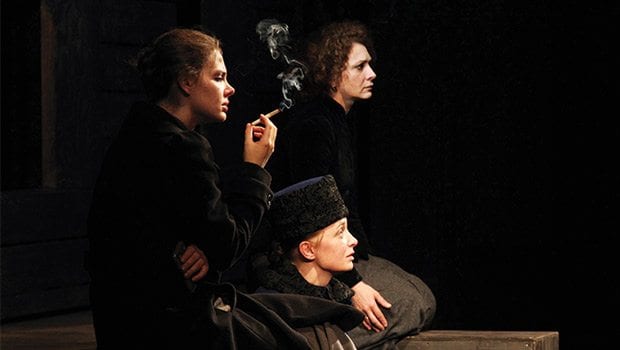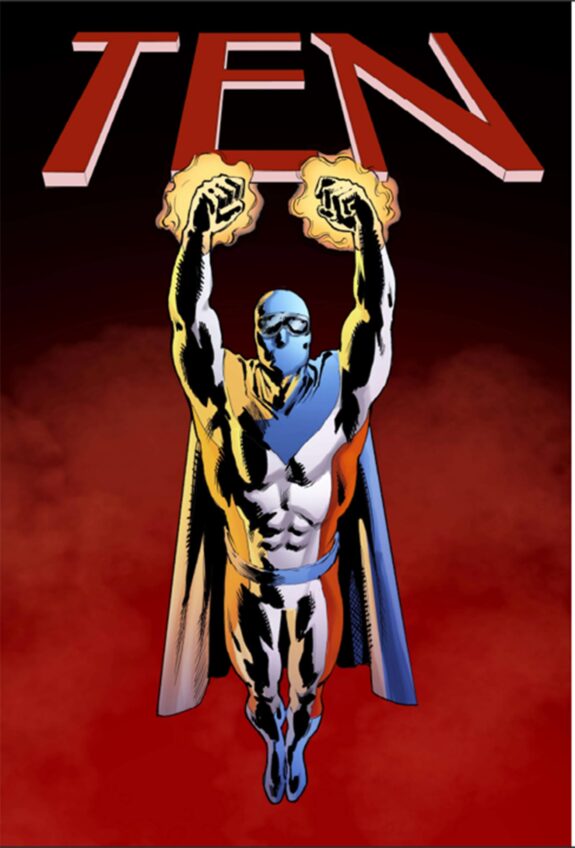‘We must live…’
Maly Drama Theatre presents Chekhov’s ‘Three Sisters’

The grave and beautiful production of Anton Chekhov’s play “The Three Sisters,” by the Maly Drama Theatre of St. Petersburg, Russia, suited the Cutler Majestic Theatre in Boston, where ArtsEmerson hosted the company’s five performances last week.
Anton Chekhov (1860-1904) wrote the play in 1900, just three years before the opening of the ornate rococo theater. Handsomely restored by Emerson College, the theater is the creation of a different area, like the way of life portrayed in the play.
Chekhov lived during turbulent times in Russia. Stratified by extremes of wealth and poverty, his country was poised for massive change.
The three sisters, Masha, Irina, and Olga, inhabit a world that is passing away. Unlike their feckless brother and his mercenary wife, the sisters cling to their ideals as well as their longing to leave their provincial town and return to their childhood home in Moscow. Years before, their widowed father, an army general, moved them to the provinces, where he headed an army brigade. Now that he has died, the sisters plan to sell the family house and move to Moscow. But fate intervenes and their dreams elude them.
Even the brigade that has been their bulwark against loneliness will soon be dispatched to another part of Russia.
Performed in Russian with English subtitles, the three-hour production of Chekhov’s tragicomedy was directed by Lev Dodin, artistic director of the Maly Drama Theatre. In the program, Dodin notes Chekhov’s attention to the “tragic discrepancies between our yearnings and reality.” He points out that Chekhov writes in “the universal language of loss” and renders “the stern tone in which life speaks to us.”
In Dodin’s staging, just as in Chekhov’s script, even the smallest details are telling.
Alexander Borovsky designed the period costumes and spare set. A wall with windows forms a stage-filling silhouette of a manor house that from a distance looks strong and intact. But when it moves to the front of the stage in the closing minutes of the play, its surface looks frayed and peeling — as vulnerable as the lives of its original owners.

Author: Photo: Viktor VassilievFamily and friends pose for a group portrait in Maly Drama Theatre production of “Three Sisters.”
The sisters wear the dresses specified by Chekhov in his script: Irina, the youngest sister, age 20 as the play begins, wears a white dress; Masha is outfitted in a black dress; and Olga, the oldest sister, wears the blue official garb of a teacher. Most of the men are attired as military officers.
Lighting by Damir Ismagilov and dance coaching by Yuri Vasilkov are indispensible to this staging of Chekhov’s play, which has little action but plenty of talk. The superb cast moves about a lot both on stage and in the aisles and performs a great deal of physical acting. The actors embody the quirks and flaws of their characters while performing in a sublime ensemble that renders importance to each part — even a momentary comic touch.
On stage for just a minute or two, the loutish doorman Ferapont (Alexander Koshkarev) disrupts a family portrait, chomping food as he stomps through the middle of the posed group
At first, the women’s intensely emotional facial expressions and gestures seem odd; but soon they feel natural, suiting a play that makes characters’ inner lives visible. Embraces are fierce and couples drop to the floor as if in a ballet. When Masha’s husband and sisters unwrap her grip on her departing lover, her arms snap crosswise on her chest and she resembles a corpse.
The play opens as the family prepares to celebrate the name day of Irina (Elizaveta Boyarskaya). She and Olga (Irina Tychinina) speak of their hopes for a new life in Moscow, where they will work and serve others. Among their guests is the tipsy army doctor Chebutikin (Sergey Kuryshev), a doting old friend who loved their mother.
In one of the play’s moments of gentle satire, Irina earnestly tells him, “And if I don’t get up early in future and work…then you may refuse me your friendship.” Chebutikin responds tenderly, “I’ll refuse, I’ll refuse.”
Adorned with a pyramid of black curls that matches her dress, Masha (Ksenia Rappoport) is seated in a window, silently reading a book. Posing in profile, she rests in a pool of light, like a figure in a Vermeer painting.
When she does stir, Masha reveals herself to be the quirkiest of her sisters, and the one with the sharpest lines. Greeting the gracious Lieutenant Tuzenbach (Oleg Ryazanzev), an idealistic baron, and his nasty companion of much shorter stature, Captain Soleni (Stanislav Nikolskiy), Masha recalls the old days when all of the brigade’s officers would attend their parties and says, “today there’s only a man and a half.”
Later, talking to the toxic Soleni, Masha simply addresses him as “you very awful man.” Of her brother Andrey’s love interest, Natasha, who will soon be his wife, Masha says,
“You should see the way she dresses! Quite prettily, quite fashionably too, but so badly!” Assuring her sisters that their beloved brother is not in love, Masha says, “After all he has taste, he’s simply making fun of us.”
But Andrey, a baby-faced Alexander Bikovsky, does marry the manipulative Natasha (Ekaterina Kleopina), and by act four, four years later, he has mortgaged the family house that was to be an inheritance shared with his sisters to bail himself out of debt.
Masha’s husband, the high school teacher Kuligin, is at first a comical figure, whose present to Irina is his book, a 50-year history of the school. When she tells him he has already given it to her, he promptly gives it to one of the officers. Sergey Vlasov conveys his character’s doltishness and later, his compassion.
A newcomer to the naming day celebration is Vershinin, lieutenant-colonel in charge of the battery. Igor Chernevich brings out the tragic gravitas of Vershinin, who becomes Masha’s lover.
By the last act, the crass Natasha, now Andrey’s wife, has taken over the house, evicted the family’s beloved nanny, forced Olga and Irina to share a bedroom, and announced her plan to cut down the avenue of fir trees that ring the property.
Deprived of their inheritance, the sisters will not return to Moscow. Masha’s lover has left with his soldiers, and Irina’s would-be husband has lost his life in a senseless duel. Olga takes the nanny into her home and resigns herself to a life as a teacher in the town. Irina will leave and pursue a life of service to others. Masha says, “We remain alone, to begin our life over again. We must live… we must live….”






